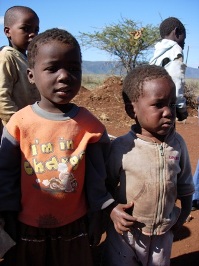130,000 Swazi children orphaned and vulnerable

The article below just appeared last week in Yahoo. I went to Swaziland in 2004 and was appalled to see that 70,000 children were considered orphans – 7% of the population. Now the figure has nearly doubled. Our ministry has a couple of dozen heroes over there now trying to battle this tidal wave of despair. We need help – no less appalling is the number of church building programs going on in America when this kind of opportunity/need stares us in the face.
 MBABANE (AFP) –
MBABANE (AFP) –
Nearly a third of Swaziland‘s children are considered orphaned and vulnerable as AIDS
takes its toll on the country, a study commissioned by the state’s
emergency response council said Friday
“There are currently 130,000 OVCs (orphaned and vulnerable children) in
the country, which represents 31.1 percent of all children
countrywide,” the study said.
“However, it is projected that the OVC figure could rise to 200,000 by the year 2010.”
It added: “HIV and AIDS
is permanently altering the structure of Swazi society. It is expected
that by 2025 there will be a thinning of the older age groups and the
very young.”
Life expectancy in the country dropped from 60 years in 1997 to the
world’s lowest of 31.3 in 2004, while the mortality rate has sharply
increased across the entire population over the past 15 years, the
report added.
According to UNICEF‘s website, HIV prevalence among 20 to 30-year-olds is nearing 50 percent, higher than the national adult average.
In Swaziland, close to 40 percent of adults are living with HIV and AIDS, the highest infection rate anywhere in the world, UNICEF said.
To help, go to AIM’s Swaziland ministry page. Also, check out:



This is so sad and tears my heart out for these precious children. My wife and I are about to have our 3rd child and want to get involved helping orphans but don’t know where to begin.
Chris – If you’re interested, please get in touch with me thru the “Email me” link above and I’ll connect you to some people who can talk to you.